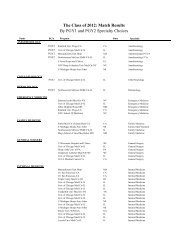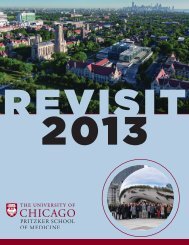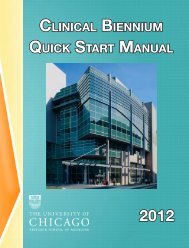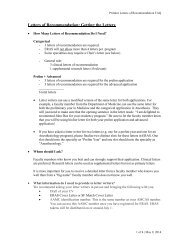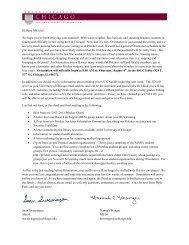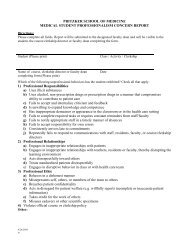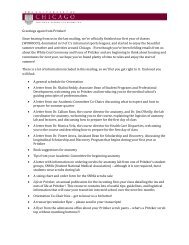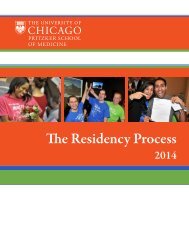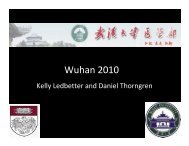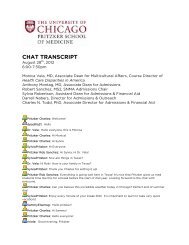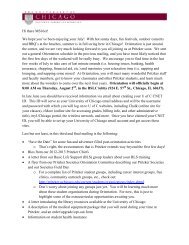Summer Reading List - Pritzker School of Medicine - University of ...
Summer Reading List - Pritzker School of Medicine - University of ...
Summer Reading List - Pritzker School of Medicine - University of ...
Create successful ePaper yourself
Turn your PDF publications into a flip-book with our unique Google optimized e-Paper software.
hSuggested <strong>Reading</strong> <strong>List</strong>MEDICAL NONFICTIONHow Doctors Think by Jerome Groopman (336 pp.)The author, an oncologist at Harvard Medical <strong>School</strong>, exploresthe doctor-patient relationship and the biases physicians bringinto the clinical encounter.Darkness Visible: A Memoir <strong>of</strong> Madnessby William Styron (84 pp.)Styron was an acclaimed novelist (Sophie’sChoice) and essayist who died in 2006.This is the true account <strong>of</strong> his descent intoa crippling and almost suicidal depression,and his enlightening path to recovery.How We Die: Reflections <strong>of</strong> Life’s Final Chapter by Sherwin Nuland(320 pp.)Dr. Sherwin Nuland (a surgeon at Yale <strong>University</strong>) won the 1994National Book Award with this exploration <strong>of</strong> what death means tothe doctor, patient, nurse, administrator, and family. Nuland closeshis book with a discussion <strong>of</strong> how we can control our own final daysand those <strong>of</strong> our loved ones – a critical text for medical studentsand physicians alike.The Protest Psychosis: How Schizophrenia Became a BlackDisease by Jonathan Metzl (272 pp.)The author, Jonathan Metzl tells the shocking story <strong>of</strong> howschizophrenia became the diagnostic term overwhelminglyapplied to African American protesters at Ionia—for politicalreasons as well as clinical ones. Expertly sifting through a vastarray <strong>of</strong> cultural documents, Metzl shows how associationsbetween schizophrenia and blackness emerged during thetumultuous decades <strong>of</strong> the 1960s and 1970s—and he provides acautionary tale <strong>of</strong> how anxieties about race continue to impactdoctor-patient interactions in our seemingly postracial America.<strong>Reading</strong> | Sponsored by the <strong>Pritzker</strong> Book Club
hPathologies <strong>of</strong> Power: Health, Human Rights, and theNew War on the Poor by Dr. Paul Farmer(438 pp.)Many medical students have been inspired by the work <strong>of</strong>physician-activist- anthropologist, Dr. Paul Farmer – thesubject <strong>of</strong> Tracy Kidder’s Mountains Beyond Mountains.This book is probably Dr. Farmer’s most accessible workon how economic deprivation, structural violence, andinternational financial organizations negatively impactthe health <strong>of</strong> billions <strong>of</strong> the world’s poor.Body <strong>of</strong> Work: Meditations on Mortality from theHuman Anatomy Lab by Christine Montross(320 pp.)Formerly a poet and writing teacher, Christine Montrosswrote this memoir during her medical training at Brown<strong>University</strong>. It’s the story <strong>of</strong> not only her own personalexperience in anatomy, but the centuries old history <strong>of</strong>studying cadavers.Moonwalking with Einstein: The Art and Science <strong>of</strong>Remembering Everything by Joshua Foer (320 pp.)This recent bestseller entertainingly looks into the art andscience <strong>of</strong> memory and memorization. Not exactly medicallyrelated,but it might be a nice introduction to memorytechniques that will hold you in good stead for the manyyears <strong>of</strong> studying ahead.<strong>Reading</strong> | Sponsored by the <strong>Pritzker</strong> Book Club
hMEDICAL FICTIONCutting for Stone by Abraham Verghese (667 pp.)Dr. Abraham Verghese is a physician, novelist, and pr<strong>of</strong>essorfor the Theory and Practice <strong>of</strong> <strong>Medicine</strong> at the Stanford<strong>University</strong> <strong>School</strong> <strong>of</strong> <strong>Medicine</strong>. Few physicians today writeas eloquently as Dr. Verghese about the essence and nearspiritualexperience <strong>of</strong> caring for patients. This novel,according to Amazon.com, “is an unforgettable story <strong>of</strong>love and betrayal, medicine and ordinary miracles – and twobrothers whose fates are forever intertwined.”Tinkers by Paul Harding(191 pp.)This incredible book, whichwon the 2009 Pulitzer Prizein Fiction, beautifully unfoldsthe history and final thoughts<strong>of</strong> a dying grandfathersurrounded by his family inhis New England home.Of Love and Other Demons by Gabriel Garcia Marquez(160 pp.)From Library Journal: “In a Latin American port cityduring colonial times, a young girl named Sierva Mariade Todos los Angeles, the only child <strong>of</strong> the ineffectualMarquis de Casalduero, is bitten by a rabid dog. Herfather, who has shown no interest in the child, begins acrusade to save her life, eventually committing her tothe Convent <strong>of</strong> Santa Clara when the bishop persuadeshim that his daughter is possessed by demons. In fact,Sierva Maria has shown no signs <strong>of</strong> being infected byrabies or by demons; she is simply being punished forbeing different…Nobel Prize winner Garcia Marquezwrites with his usual inventiveness, but over the yearshis prose style has crystallized and condensed. Theresult is a tale whose sharp social retort is made allthe louder by the luminous, uncluttered telling.”<strong>Reading</strong> | Sponsored by the <strong>Pritzker</strong> Book Club
hCHICAGO NONFICTIONWhen Work Disappears: The World <strong>of</strong> the New Urban Poor byWilliam Julius Wilson (322 pp.)This is probably the most important book written in the last25 years about the rising inner-city poverty, joblessness, andsegregation in the United States. It’s not explicitly about Chicago,but Wilson’s research and writing <strong>of</strong> this book took place duringhis long tenure as a sociology pr<strong>of</strong>essor at the <strong>University</strong> <strong>of</strong>Chicago.Black Boy by Richard Wright (448 pp.)This autobiography by Richard Wright (who lived inChicago from 1927 to 1935), published in 1945, usesnovelistic techniquesto describe his harshboyhood and youth inrural Mississippi. It is apowerful and disturbingaccount <strong>of</strong> socialinjustice and humansuffering in the JimCrow South.Chicago: City on the Make by Nelson Algren(152 pp.)This is arguably the best book written about Chicago.Algren presents 120 years <strong>of</strong> Chicago history throughthe lens <strong>of</strong> its “nobodies nobody knows” – thetramps, hustlers, aging bar fighters, freed death-rowinmates, and anonymous working stiffs who prowlits streets.<strong>Reading</strong> | Sponsored by the <strong>Pritzker</strong> Book Club
hCHICAGO FICTIONHerzog by Saul Bellow (400 pp.)Saul Bellow is indisputably Chicago’s most famousliterary son, who for a time called Hyde Park andthe <strong>University</strong> <strong>of</strong> Chicago home. Herzog tells thetale <strong>of</strong> Moses E. Herzog, a tragically confusedintellectual who suffers from the breakup <strong>of</strong> hissecond marriage, the general failure <strong>of</strong> his life, andthe specter <strong>of</strong> growing up Jewish in the middle part<strong>of</strong> the 20th century.The Lazarus Project by Aleksandar Hemon(304 pp.)On a visit to Chicago in 1992, Hemon becamestranded when he was unable to return to hisnative Sarajevo after war broke out. He nowcalls Chicago his new home. This imaginativenovel is a dark, hilarious, and poignant tale <strong>of</strong>what it means to be an immigrant in America.It weaves two stories together: the 1908 killing<strong>of</strong> Lazarus Averbuch, a 19-year-old Jewishimmigrant who was shot dead by the chief <strong>of</strong>Chicago police, and the story <strong>of</strong> Vladimir Brik,a Bosnian-American writer living in Chicago(in 2008) who gets funding to travel to EasternEurope and unearth what really happened.<strong>Reading</strong> | Sponsored by the <strong>Pritzker</strong> Book Club



